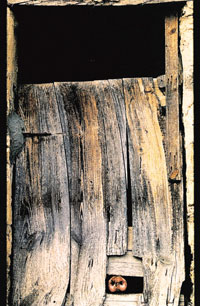Welcome to the history page. It is lovely to be back 'online' with the very special readership here at Ibiza History Culture. I've decided to reinitiate our page with a current island event very deserving of mention: the recently instituted 'Colloquium on the Spanish Civil War and Postwar'. This annual fixture, inaugurated just last year, constitutes the highpoint in a week-long examination of this important chapter in Spanish history. Leading up to the colloquium is a film series consisting of five films dealing with different aspects of the war. The films are projected, one per evening, from Monday to Friday, and provide substantial grist for the wheels of thought and discussion. This year, the event's closing act will be the performance, by local thespians, of 'La Buhardilla' by French playwright, Claude Merdedié. The piece centres on the anti-clerical sentiment that permeated Spain both before and after the war, and features, rather ironically, Stella Matutes (Abel's daughter) in the role of a revolutionary anarchist.
The Lessons of History
Why, people may ask, is an examination of this war - or any bygone war - important to us today? Not surprisingly, the same question was put forth by one young attendee at the colloquium. Juan Antonio Porto, panel-member, scriptwriter and superb public speaker answered quite simply, "Because, 'Those who cannot remember their past are condemned to repeat it.'" These wise words, written by the Spanish poet and philosopher, George Santayana, in 1905, just before he was awarded a full professorship at Harvard University, beautifully express one of the most profound truths on the importance of history.
More mundanely, I might add, that retrospective examinations such as this one serve the purpose of bringing the disturbing events of war into the light of day where they can be seen, dealt with, and assimilated by a society that still lives in their shadow. As film critic, Juan Cobos, another panel-member at the colloquium, stated significantly, "Half of Spain has never got over the Civil War, while the other half is in denial that it ever existed." Most would agree that his remark is a shrewd and accurate description of contemporary Spanish society.
Personal Testimonies
As with any civil war, this one cut deep scars into the country, scars that still have not healed completely. Part of the reason for the lingering malaise is that any type of discussion of the war was taboo during the 40 years of Franco's fascist dictatorship. Several members of the audience shared an eerily common experience of the postwar as young children: namely, that their parents never mentioned the war, nor the atrocities they witnessed, nor the crushing disappointment of burying, not only their neighbours and loved ones, but their dreams of democracy. An unspoken sadness hung over their households, "like a shroud the grown ups wore", real yet indefinable.
Another young woman recalled that she was nine years old when Franco died (1975). By the time she reached secondary school, five years later, Spain had already embarked on democratic statehood under a parliamentary government with free elections, several political parties, etc. Even so, her teachers ("mostly holdovers from the old guard") never once touched on the Civil War. It was always at the end of the history book, and somehow they never got round to it. What was even more suspect, they also never studied the French Revolution, because (as she later deduced) the ideas it contained were too dangerous to expose to young, impressionable minds.
Another young woman of 27 commented candidly, but "with all due respect", that, since no one ever had told her and her generation anything about the war, "We don't really care one way or another". She admitted that she saw the Civil War as nothing more than a remote historical episode that her grandparents had lived through when they were very young. In her worldview, the war has nothing to do with today's larger environmental and international concerns, much more urgent issues than Spain's self-preoccupation with a conflict that already belongs to last century. Nonetheless, she wished the panel (all of whom were members of the Spanish film industry, i.e. directors, actors, writers, etc.) luck in their ef! forts at heightening public awareness in this area - adding audaciously that their task was made even more difficult by the fact that such films never turned a profit. "My generation's been raised on Schwarzenegger," she concluded. Could she mean that cinema-goers (whose average age is between 15 and 24) are used to spectacular films with tenuous plotlines that recreate belligerent situations merely for the amusement of the audience?
Closing
If, indeed, this young lady's attitude is representative of today's younger generation, it would appear that yet another of Aldoux Huxley's observations has become a substantiated truth. In 1959, Huxley wrote in his Collected Essays: "That men do not learn very much from the lessons of history is the most important of all the lessons that history has to teach." A Sobering thought for times like these.
Now the topic's been raised, we might as well find out a little more about the Spanish Civil War, and in so doing validate the lessons it contained. To get our bearings, we will devote next week to a general overview of this short but intense conflict. Then, once the larger picture is clear, we will examine the specific theatre of war that was played out in Ibiza.
Note: Once again, many thanks to Martin Davies, for his impeccable back-up research for this article.
Emily Kaufman
emilykaufman@ibizahistoryculture.com

